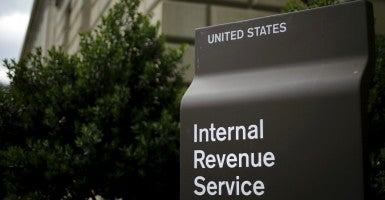For more than four years, Maryland dairy farmer Randy Sowers has been fighting the federal government, asking it to right what many say was a wrong.
In Feb. 2012, two federal agents told Sowers, who owns South Mountain Creamery in Frederick, Md. that the Internal Revenue Service was seizing more than $60,000 from his farm’s bank account under a subset of civil forfeiture laws governing cash transactions.
According to the IRS, Sowers had committed structuring violations. Structuring is the act of making consistent cash deposits or withdrawals of under $10,000 to avoid government reporting requirements.
But the dairy farmer didn’t know he was doing anything wrong, and because Sowers and his wife sold milk at local farmer’s markets—where customers paid primarily in cash—they frequently made cash deposits into the business’s bank account.
Sowers and his wife tried to fight to the government to get their money back, but ultimately decided to settle.
The IRS returned $33,436 to the Sowers and kept $29,500.
On Wednesday, Sowers and his lawyer, Robert Johnson of the Institute for Justice, will appear before a panel of lawmakers on the House Ways and Means Oversight Subcommittee to detail Sowers’ lengthy battle with the federal government and discuss broader issues with how the IRS is using civil forfeiture.
“One of the main issues that’s going to come out of this hearing is the IRS still is holding tens of millions of dollars that it seized from people that it wouldn’t have seized under its policies today,” Johnson told The Daily Signal. “Those people deserve to get their money back, and Randy Sowers deserves to get his money back.”
Members of the subcommittee, led by Chairman Peter Roskam, R-Ill., will hear from Sowers and Johnson, as well as representatives from the IRS and Justice Department, including IRS Commissioner John Koskinen.
“It’s so clear on its face: this is an abuse of power,” Roskam told The Daily Signal. “The government is being dismissive of notions of fundamental justice, even when they acknowledge that the underlying policy is wrong, even when the IRS has apologized for the implementation of that policy. It is still a miserable enterprise trying to funds restored to the individuals.”
Under civil forfeiture, law enforcement has the power to take cash, cars, and property from people if they suspect the property is connected to criminal activity.
Sowers and Taylor’s Produce owner Calvin Taylor, who is also testifying before the committee, had money seized under civil forfeiture for structuring.
Civil forfeiture and structuring laws were put in place to curb drug trafficking and money laundering. However, in recent years, the government has taken money and property from innocent property owners who were never charged with a crime and were unaware they were breaking the law.
According to a study from the Institute for Justice, the IRS forfeited roughly $43 million from property owners in 618 cases from 2007 to 2013. In each of those cases, the IRS didn’t report any suspicion of criminal activity outside of the pattern of cash deposits or withdrawals.
“Every American knows that for the IRS to take somebody’s money and to threaten to put them in jail because of how they deposit money in the bank is wrong,” Johnson said. “It’s not how our country should work.”
In the last two years, the IRS and Justice Department changed their internal policies regarding structuring, allowing the agencies to pursue structuring cases only in instances where the money stems from criminal activity.
Under the policy changes, a number of business owners, including Sowers, wouldn’t have had their money taken.
“When you first describe the civil asset forfeiture approach to things, and you realize this was set up in order to go after Mafia front groups and human trafficking operations and meth labs, people say it makes perfect sense,” Roskam said. “But when you go further and describe the abuse of it, then there’s a lot of concern all the way around.”
“This in the larger context of IRS targeting based on political philosophy and religious beliefs, it fits this larger pattern and a larger theme and a larger element of concern of is this government watching out for me or is this government coming after me?” he continued.
Despite action from the IRS and Justice Department, Johnson said the Institute for Justice is aware of recent cases involving people who had money seized for structuring violations even though the money wasn’t tied to illegal activity.
Instead of pursuing the cases through civil forfeiture, Johnson said, the IRS is using criminal forfeiture instead, and threatening to prosecute property owners for structuring.
“Structuring is a crime, but there’s nothing morally criminal about it,” he said. “It’s a crime because Congress said it’s a crime. It’s true, the government can put you in jail for depositing money in the wrong amounts.”
Over the last few months, outside groups like the Institute for Justice and a bipartisan group of lawmakers from the Ways and Means Committee have pressured the IRS and Justice Department to return money wrongfully seized under civil forfeiture for structuring violations.
Last year, the Institute for Justice filed “petitions for remission or mitigation” with the federal government on behalf of Sowers and North Carolina convenience store owner Ken Quran. The petitions, similar to a pardon, called on the government to return money taken from the small business owners.
The IRS returned the more than $153,000 it seized from Quran, but did not respond to Sowers’ petition.
In August and again in March, Republicans and Democrats on the Ways and Means Oversight Subcommittee sent letters to the IRS, Department of Treasury, and Department of Justice urging them to return money “inappropriately” seized by the IRS through civil forfeiture.
The lawmakers also encouraged the agencies to give property owners who had money taken and were never charged with a crime to petition the government to get their cash back.
“My concern is the dismissiveness of the administration on this,” Roskam said. “They’re not seeing an obligation to go and make things right. Their feeling, at least what they’re communicating so far, is that was then, this is now, and if someone suffered, then someone suffered.
“They’re not seeking justice here, and that’s a problem.”
































